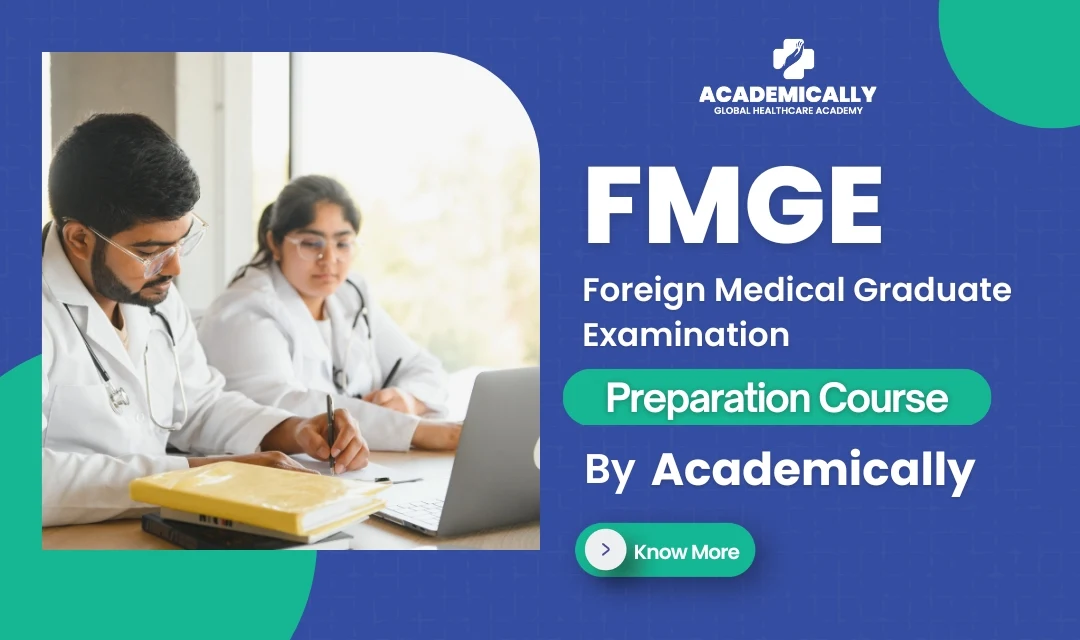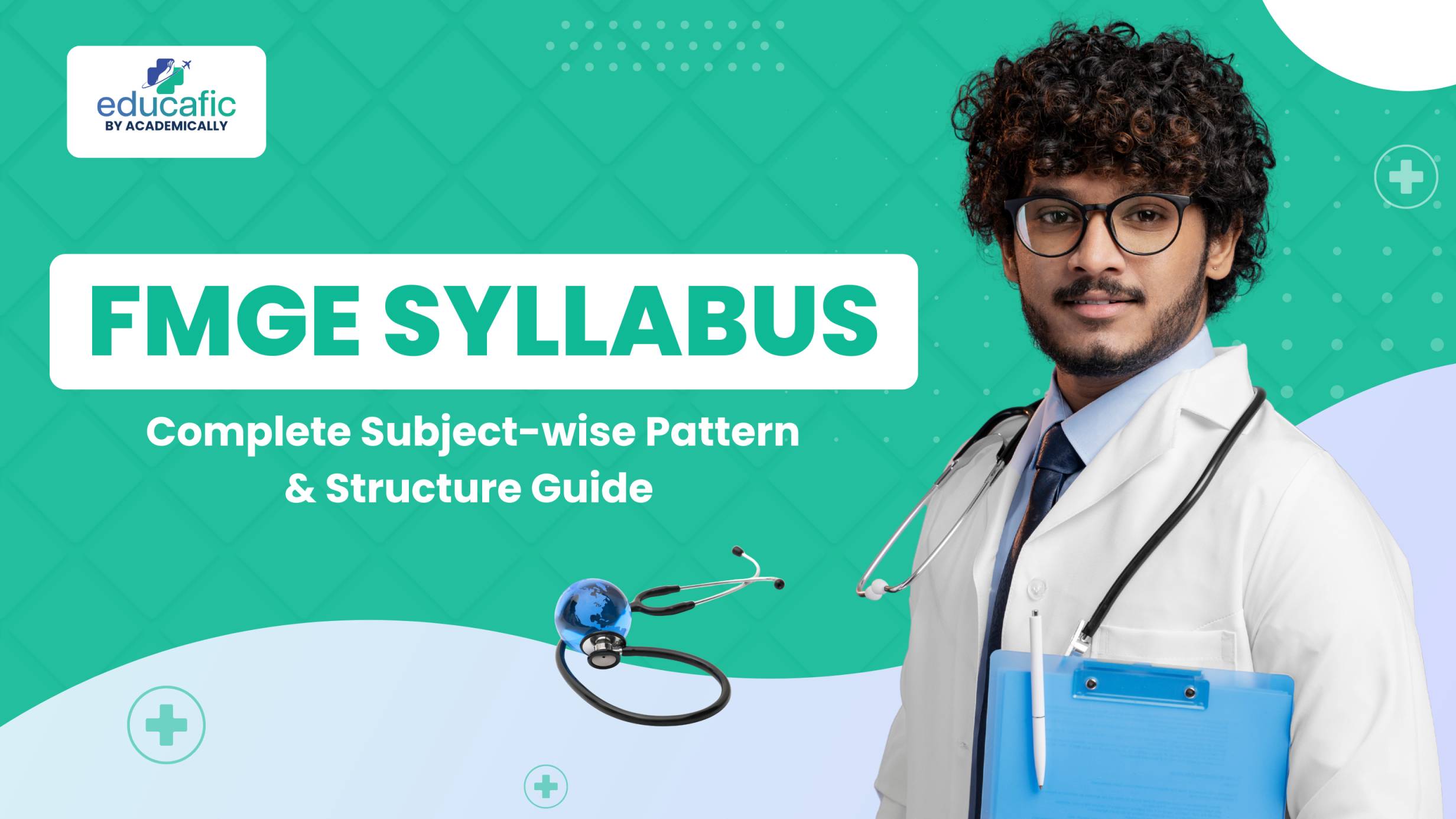Did you know that every year, thousands of MBBS graduates from abroad take the FMGE exam (Foreign Medical Graduate Examination)? For all these graduates, this exam is the final step before obtaining their license in India and beginning their career as a doctor in their home country.
For many graduates, the FMGE exam can be a daunting challenge. They feel overwhelmed and don’t know how to start their preparation, which is why the first step to understanding an exam is knowing its syllabus and recent updates.
In this blog, we’ll break down the subject-wise syllabus, marks distribution, and exam pattern, among other details, so you can plan smartly and avoid confusion.
FMGE Exam Pattern
| Particulars | Details |
| Mode of Exam | Online (Computer-Based Test) |
| Medium | English |
| Type of Questions | Multiple Choice Questions (MCQs) |
| Total Questions | 300 |
| Division | Part A and Part B |
| Duration | 5 Hours (2.5 hrs for each part) |
| Marking Scheme | +1 for every correct answer. No negative marking for wrong/unanswered |
| Qualifying Marks | Minimum 150 out of 300 |
| Exam Frequency | Twice a year (June & December) |
| Conducting Body | NBEMS (National Board of Examinations in Medical Sciences) |
FMGE Syllabus 2026
- Anatomy
- Medicine
- Biochemistry
- Obstetrics & Gynecology
- Forensic Medicine
- Ophthalmology
- Community Medicine
- Radiodiagnosis
- Pathology
- Psychiatry
- Orthopaedics
- Pharmacology
- Paediatrics
- Radiotherapy
- General Surgery
- Anaesthesia
- Otorhinolaryngology (ENT)
- Dermatology
- Microbiology
- Physiology
- Respiratory Diseases
FMGE 2026 Syllabus: Subject-wise Marks Distribution
| Subject | Marks Allotment |
| Physiology | 17 |
| Anatomy | 17 |
| Biochemistry | 17 |
| Microbiology | 13 |
| Pharmacology | 13 |
| Pathology | 13 |
| Forensic Medicine | 10 |
| Medicine | 33 |
| Dermatology | 5 |
| Surgery | 32 |
| Anaesthesia | 5 |
| Orthopaedics | 5 |
| Radiodiagnosis | 5 |
| Gynecology and Obstetrics | 30 |
| ENT | 15 |
| Ophthalmology | 15 |
| Paediatrics | 15 |
| Psychiatry | 5 |
| Radiotherapy | 5 |
| Community Medicine | 30 |

FMGE Syllabus 2026: Complete Subject-wise
Physiology
- General physiology
- Cardiovascular system
- Respiratory system
- Kidney
- Nerve and muscle
- Endocrine glands
- Gastrointestinal tract
- Central nervous system
- Reproduction
- Skin and body temperature
- Special senses
- Body fluids
Anatomy
- General anatomy
- Elements of anatomy
- Histology
- Surface anatomy
- Regional anatomy
- Sectional anatomy
- Radiological anatomy
- Embryology
- Human genetics
Biochemistry
- Cell and subcellular structures
- Enzymes
- Nutrition and digestion
- Energy and intermediary metabolism
- Carbohydrate, protein, amino acid, lipid, purine, and pyrimidine metabolism
- Liver functions
- Biological oxidation
- Vitamins, minerals, and isotopes
- Protein biosynthesis and biochemical genetics
- Acid-base balance, buffers, and hydrogen ion concentration
Microbiology
- General and clinical microbiology
- Bacteriology
- Mycology
- Parasitology
- General and systemic virology
- Immunology
Pathology
- Cell injury, inflammation, and repair
- Infectious diseases
- Immunopathology
- Neoplasia and growth disturbances
- Cardiovascular, respiratory, renal, hepatic, endocrine, ocular, and reproductive pathology
- Haematology and lymphoreticular system
- Musculoskeletal pathology
- Nutritional and genetic disorders
Forensic Medicine
- Types and mechanisms of death (asphyxial, dowry, malnutrition-related)
- Postmortem changes and autopsies
- Examination of injuries and mutilated remains
- Medico-legal reports, inquests, and certifications
- Sexual offences, virginity, and infanticide
- Pregnancy, delivery, and related medico-legal aspects
- Toxicology and forensic psychiatry
- Biological fluids and seminal stains
Pharmacology
- General pharmacology and clinical pharmacology principles
- Chemotherapy and toxicology
- Drugs affecting the CNS, CVS, respiratory, GI, endocrine, and blood systems
- Autacoids and related drugs
- Drugs in anaesthesia and rational drug use
Anaesthesia
- Role of anaesthesiologist and ICU care
- Local anaesthesia and airway management
- Poisoning and shock management
- Blood transfusion, fluid balance, and ventilation techniques
- Muscle relaxants, CPR, and anaesthetic agents
- Stages of anaesthesia and physiology of respiration
General Surgery
- Wounds, burns, skin grafting, ulcers, cysts, sinuses, fistulae
- Haemorrhage, shock, and venous diseases
- Organs and systems: GI tract, genito-urinary system, pancreas, liver, spleen, heart, lungs, brain, thyroid, breasts
- Trauma, cranio-cerebral injuries, and musculoskeletal disorders
Obstetrics & Gynaecology
- Normal labour, operative obstetrics, post-caesarean care
- Fertility, infertility, and family planning
- Maternal morbidity and mortality, safe motherhood, RCH
- Genital infections, prolapse, endometriosis, tumours, and carcinoma
- Menstrual disorders and pharmacotherapeutics in obstetrics
- Newborn care and breastfeeding
Ophthalmology
- Eye anatomy, lids, cornea, lens, retina, optic nerve, uveal tract, sclera
- Refractive errors, glaucoma, squint, lacrimal system
- Ophthalmic surgery and injuries
- Community ophthalmology and basic sciences
Psychiatry
- Personality disorders, psychoses, schizophrenia, mania, depression
- Anxiety, hysteria, dementia, drug abuse, alcoholism
- Mental status examination and behavioral sciences
- History of mental illness
Respiratory Diseases
- Tuberculosis and National TB Control Programme
- Management of general respiratory conditions
Medicine
- Cardiovascular, respiratory, gastrointestinal, endocrine, renal, neurological systems
- Emergency medicine and geriatrics
- Haematology and infections
- Clinical methods, chemical/physical exposures, and common diseases
Paediatrics
- Neonatology, growth and development, vital statistics
- Respiratory, GI, endocrine, CNS, nephrology
- Genetics, nutrition, infections, and paediatric emergencies
Radiotherapy
- Principles of radiotherapy, chemotherapy, and nuclear medicine
- Radio-isotopes in diagnosis and treatment
- Early detection and management of cancers
- Radiation reactions
Dermatology
- Dermatitis, eczema, lichen planus, vesiculobullous diseases
- Pigment metabolism, melanocytes, sebaceous gland function
- Infections, allergic disorders, nutritional/atmospheric skin disorders
- STD, leprosy, psoriasis, alopecia, hirsutism
Radiodiagnosis
- Excretory, skeletal, CNS, GI, cardiovascular, respiratory, obstetrics & gynaecology
Orthopaedics
- Bone, joint, spine injuries and tuberculosis
- Neuro-muscular disorders, physical medicine, and rehabilitation
- Vascular injuries and regional orthopaedic conditions
- Traumatology
Community Medicine
- Epidemiology, biostatistics, occupational health, medical sociology
- International health, urban and school health
- Health planning, evaluation, and education
- Nutrition, reproductive & child health, communicable & non-communicable diseases
FMGE 2026 Exam Tips
- Know the Pattern – 300 MCQs, 50% passing marks. Focus on high-weightage subjects.
- Prioritize Subjects – Medicine, Surgery, Obstetrics & Gynaecology, and Community Medicine are high scoring.
- Study Smart – Use standard books and MCQ question banks.
- Practice & Revise – Solve past papers, take mock tests, and revise key points regularly.
- Memorize Key Facts – Use mnemonics, charts, and tables for drugs, lab values, and diseases.
- Time Management – Around 2 minutes per question; avoid getting stuck.
- Stay Updated – Keep track of national health programs and guidelines.
- Take Care of Yourself – Sleep well, eat healthy, and manage stress.
We know that preparing for the FMGE exam can be challenging. However, with a structured approach and guidance from a mentor, the chances of success are significantly higher. This is where Academically’s FMGE Preparation Course comes in. It offers comprehensive study materials, self-paced sessions, high-yield notes, AI mock tests, and expert mentorship designed to help you maximize your scores and clear the exam confidently on the first attempt. Enroll today and turn your dream of practising medicine in India into reality with a focused, step-by-step preparation strategy.





